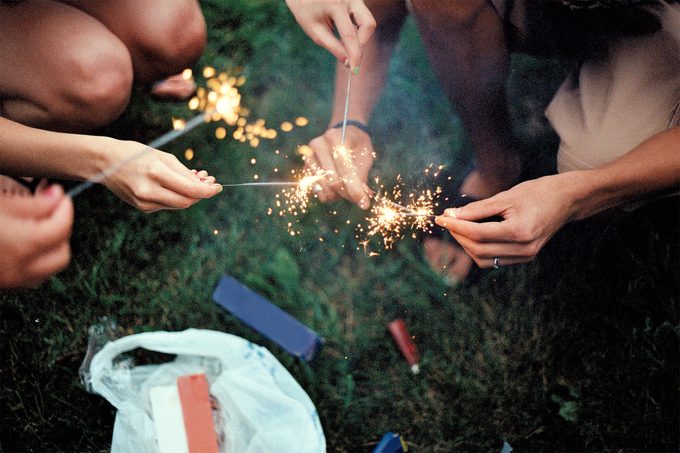Before you attempt to light up the night with a DIY fireworks spectacle, find out the states where fireworks are legal

These Are the States Where Fireworks Are Legal

There’s nothing more American than watching 4th of July fireworks—not even apple pie. As fun as the celebratory sparks are, they’re also heavily regulated from state to state and aren’t legal everywhere in the U.S. To save you time figuring out the states where fireworks are legal, we’re letting you know below.
Fireworks are one of the best additions to your Independence Day gathering. Depending on where you’re watching—or lighting—4th of July fireworks displays this year, it’s crucial to know all local legal and safety measures. So read on to find out the states where fireworks are legal.
Get Reader’s Digest’s Read Up newsletter for more travel, fun facts, humor, cleaning and tech all week long.
In which states are fireworks legal?

Forty-nine states plus Washington, D.C., allow consumer fireworks in some form, but exactly what that form is varies by state. Depending on state laws, it might help you determine where to take the best 4th of July vacation.
For example, Indiana is relatively lenient compared with other states.
There, all consumer fireworks that comply with the construction, chemical composition and labeling regulations of the U.S. Consumer Products Commission are permitted, though you must be 18 to purchase them and there are limitations on when you can buy and use them. Fireworks can only be set off from 9 a.m. to 11 p.m. on non-holidays, but can go later on special occasions, like midnight on the 4th of July, two hours after sunset during 4th of July weekend and 1 a.m. on New Year’s Eve.
On the opposite end of the spectrum, California is one of the states where fireworks are legal but with stricter limits.
In California, ground and handheld sparkling devices are legal, as are cylindrical and cone fountains, wheel and ground spinners, illuminating torches and certain flitter sparklers. Anyone 16 or older is able to purchase those, but only from noon on June 28 through noon on July 6. Illegal are things like firecrackers, roman candles, chasers, wire and wooden stick sparklers and skyrockets.
There are also three states—Hawaii, Nevada and Wyoming—that allow each county to establish its own regulations regarding consumer fireworks.
Whether you’re lighting up on the 4th or Memorial Day, for a simple breakdown, these are the states where fireworks are legal, by category:
States permitting a majority of consumer fireworks
- Alabama
- Alaska
- Arkansas
- Florida
- Georgia
- Indiana
- Iowa
- Kansas
- Kentucky
- Louisiana
- Maine
- Michigan
- Mississippi
- Missouri
- Montana
- Nebraska
- New Hampshire
- New Mexico
- North Dakota
- Ohio
- Oklahoma
- Pennsylvania
- South Carolina
- South Dakota
- Tennessee
- Texas
- Utah
- Washington
- West Virginia
States permitting the sale and use of fireworks that are non-aerial and non-explosive (also known as “safe and sane”)
- Arizona
- California
- Colorado
- Connecticut
- Delaware
- Idaho
- Illinois
- Maryland (aside from certain counties)
- Minnesota
- New Jersey
- New York
- North Carolina
- Oregon
- Rhode Island
- Vermont
- Virginia
- Washington, D.C.
- Wisconsin
What type of fireworks are illegal?
Each state has different regulations about what types of fireworks are permitted, but it’s important to understand what makes fireworks unsafe. According to the Consumer Product Safety Commission, the fuses on fireworks have to burn somewhere between three and nine seconds; this is called the “fuse burn time” standard, and it prevents injuries caused by not being able to get away from the explosive in time.
Legal fireworks can also only have a maximum of 50 milligrams of pyrotechnic composition. Anything greater than that amount is considered unregulated. Also, if it’s missing a warning label, they’re likely illegal; it’s required by federal law for all fireworks to have a warning label. If your state has strict fireworks laws, leave the pyrotechnics to the professionals and find a display to enjoy.
Where are fireworks illegal?
There’s only one state that completely bans all consumer fireworks, and that’s Massachusetts. However, they do permit fireworks displays put on by professionals, so you can still catch a show for the 4th of July.
Why trust us
At Reader’s Digest, we’re committed to producing high-quality content by writers with expertise and experience in their field in consultation with relevant, qualified experts. We rely on reputable primary sources, including government and professional organizations and academic institutions as well as our writers’ personal experiences where appropriate. We verify all facts and data, back them with credible sourcing and revisit them over time to ensure they remain accurate and up to date. Read more about our team, our contributors and our editorial policies.
Sources:
- Consumer Product Safety Commission: “Consumer Fireworks Testing Manual”
- Mass.gov: “Leave Fireworks to the Professionals”
- American Pyrotechnics Association: “Directory of State Requirements for Public Fireworks Displays”
- World Population Review: “Fireworks Laws by State 2025”






















